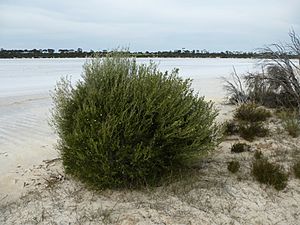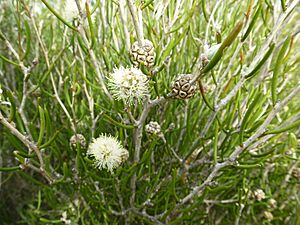Melaleuca halophila facts for kids
Quick facts for kids Melaleuca halophila |
|
|---|---|
 |
|
| M. halophila growing on the edge of a salt lake near Salmon Gums | |
| Scientific classification | |
| Genus: |
Melaleuca
|
| Species: |
halophila
|
Melaleuca halophila is a special kind of plant that belongs to the myrtle family. It's a native plant found only in the southern part of Western Australia. This plant is a bit prickly, and it looks similar to another plant called Melaleuca thapsina. However, Melaleuca halophila has white flowers, and its leaves are shorter and have more tiny hairs.
Contents
What Melaleuca halophila Looks Like
Melaleuca halophila is a shrub that can grow up to about 3 m (10 ft) tall. Its leaves are arranged one after another along the stem. They are long and narrow, shaped a bit like an oval when you look at them closely. Each leaf is about 11–30.5 mm (0.4–1 in) long and 1.7–2.5 mm (0.07–0.1 in) wide. They have a short, sharp point at the end. These leaves are also covered with short, soft hairs.
Flowers and Fruits
The flowers of Melaleuca halophila are white. They grow in round groups at the ends of branches, or where leaves join the stem. Even after the flowers bloom, the branches keep growing. Each flower group is about 15 mm (0.6 in) across. They are made up of 5 to 11 smaller groups, with three flowers in each.
The small petals on the flowers are about 1.0–1.5 mm (0.04–0.06 in) long. They fall off as the flower gets older. Around the center of each flower, there are five bundles of stamens, which are the parts that produce pollen. Each bundle has 3 to 7 stamens.
Melaleuca halophila usually flowers in October and November. After the flowers, the plant produces woody fruits. These fruits are like small, hard capsules, about 1.8–3 mm (0.07–0.1 in) long.
How it Got its Name
Melaleuca halophila was first officially described in 1999 by a scientist named Lyndley Craven. He wrote about it in a science journal called Australian Systematic Botany. The plant he studied was found near a place called Salmon Gums.
The second part of its scientific name, halophila, comes from ancient Greek words. "Halo" means "salt," and "philus" means "loving." So, "halophila" means "salt-loving." This name was chosen because the plant often grows in salty areas.
Where it Grows
Melaleuca halophila is found in specific areas of Western Australia. You can see it in the Fitzgerald Peaks and around the Salmon Gums districts. These areas are part of the Esperance Plains and Mallee regions, which are special zones for plants and animals.
Conservation Status
The Government of Western Australia's Department of Parks and Wildlife has listed Melaleuca halophila as "not threatened." This means that currently, there are enough of these plants, and they are not considered to be in danger of disappearing.
Images for kids
-
Habit on the edge of a salt lake near Salmon Gums



